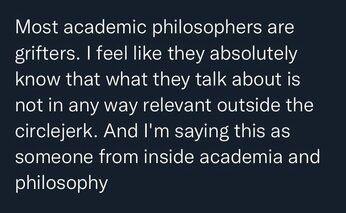
I stand by every word of my response, even if it was initially posted in anger and disgust. I foolishly allowed myself to get drawn into a few pointless "reply guy" exchanges, which are always fruitless wastes of time. But all the same, I decided to take up here some of the questions and reactions in order to explain my position in a little more depth.
There's a certain breed of philosopher like, I assume, the person who posted this tweet. For whatever reason, this person feels they must "apologize" for what they do, in the classical sense of providing some kind of defense and explanation. Now, admittedly, I plan to say a little bit in defense of what I do in this post as well, but that's not really what I'm talking about. It's almost as if this breed of philosopher feels guilty for what they do. As if they buy the culturally pervasive narrative that informs a number of American (and Western) assumptions about the "purpose" of an education, and the general worthlessness of the humanities in this task. But this philosopher, instead of holding down the fort and defending the importance of teaching philosophy, tacitly accepts the cultural narrative. "You're right," they say, "it is worthless, it is pointless, it is a 'grift,' and I'm just lucky enough to have gotten a ride on this train, so I'm gonna ride it out to retirement, milking it for everything I can get." Notice the way the person proudly advertises their bona fides: "And I'm saying this as someone from inside academia and philosophy." In other words, "You can believe me when I tell you that the cultural narrative is spot on."
One of the reply guys sarcastically responded to me by suggesting that this post was simply saying that intellectuals have a responsibility to the public, and that we should operate with certain standards. There is absolutely no evidence to that effect anywhere in the original post. None. In fact, the post seems to be reveling in the lack of any such standards or sense of responsibility.
Another person challenged me by asking whether the person's remarks were wrong, or merely offensive. My response to that question is, they are both. As I see it, there are two possible ways this post can be understood:
1) "Most academic philosophers are grifters, (but not me... I'm special)."
or
2) "I'm a grifter; therefore, most academic philosophers are grifters."
Both are self-serving. #1 is self-serving in that it is sanctimonious: "Sure, they all suck, but I'm one of the few good ones." #2 is self-serving in that it provides cover for the person to be, by their own admission, a lazy and shitty teacher: "Sure, I'm a grifter, but hey, what can I say... most philosophers are."
But however one takes it, the crux of their point rests on the claim that "most academic philosophers are grifters," which is to say, petty swindlers, acting as though what they do matters so as to dupe students into taking our meaningless classes, riding that fat cash cow all the way to the bank, while knowing deep down that we're really just engaged in a giant circlejerk.
I entered the discipline of philosophy for, I assume, the same reason that most people do: I took a class that blew my mind. I met professors who challenged me to think in ways that I had never thought before, and it sparked an evolution that, I would argue, continues to this day. It upended everything I had ever believed and drew me along with it. I tell students that once we embark upon the path of philosophy, we find ourselves faced with question upon question about who we are, and at any stage on that path, we can make the choice to turn back around and plant our heads back in the sand, but that if we continue on the path, it's as though we will eventually find ourselves looking over a precipice where we're not sure who we will be if we take the plunge. That it is scary, exhilarating, and positively transformative. That our views about right and wrong, justice, race, sex, gender, beauty, love, faith, etc., are not just epistemic propositions to which we passively give our assent, and they are certainly not a "circlejerk" to be dismissed by even its practitioners. But that they make us who we are and inform every other thing we do and every choice we make in life, and will almost certainly stick with us long beyond even a single intro course. That that is the stuff of philosophy. And I reacted so angrily to the grifter's post because most of the philosophers I know believe this too, down to their bones. That includes, by the way, scores of people, far too many, talented, passionate teachers, life-changing teachers, who adjunct several courses at multiple institutions in order to make ends meet, for no other reason than that they believe deeply in what they do, and cannot imagine themselves doing anything else in life. And for what it's worth, this is true of most of the teachers I know, whatever their discipline.
I cannot speak for the grifter, though I take him at his word that he is such. But I care too deeply about this profession to abide his blanket statement that it is true of all or most of us. Moreover, if a person wants to run a grift and make an easy buck, I could effortlessly list a hundred grifts that would be easier to run than to pursue a career in academic philosophy. I spent fifteen years of my life in college at four different institutions, went tens of thousands of dollars into debt, spent eight years on a soul-crushingly brutal job market, uprooted my family multiple times, and barely, and I mean barely, got a tenure-track job by the skin of my teeth. And now that I have it, my salary is comparable to that of my brother who is a shift supervisor in a factory. Over this holiday "break," I have taken maybe three days off, three days where I wasn't dealing with student issues, responding to departmental needs, grading, or doing research. And as I said, I'm one of the lucky ones. There are countless others, amazing teachers, doing high-quality, impactful research, inspiring students, but languishing on an unforgiving job market, because they've so dedicated themselves to their craft and believe so deeply in what they do that they simply cannot imagine doing anything else. The idea that these people are all grifters is grotesquely offensive.
One final remark: I responded as angrily and aggressively as I did because the reality is that the humanities in higher education, philosophy in particular, are facing wrathful cultural headwinds. As a culture, we've so broadly accepted for the past four decades the neoliberal political narrative of austerity - cut, cut, cut - that anything that doesn't show immediate, "practical" results is considered expendable, especially where education is concerned. But in truth, there's a very good reason why these disciplines (history, race theory, religion, philosophy, literature, gender studies, etc.) draw the ire of the politicians so aggressively. It is precisely because they foster critical thinking in the students who pursue them, and challenge them to see the world differently. Students become enamored of justice, and unwilling to accept the world in its current shittiness. They begin asking questions and refuse the status quo. Capitalism far prefers its subjects to be docile and unreflective, and to choose a major that might ultimately feed the imperial war machine. At its best, education fights the interminable uphill battle against the machine. So I'm going to quote The Madwoman in the Classroom, and leave you with this other, most beautiful tweet: "I don't want my class to prepare students for 'the real world.' I want my class to help students dream of a better world." I cannot speak for the grifter. I can only say that his blanket statement about academic philosophy more generally is wrong, and reveals far more about him than it does about the discipline of philosophy.

 RSS Feed
RSS Feed